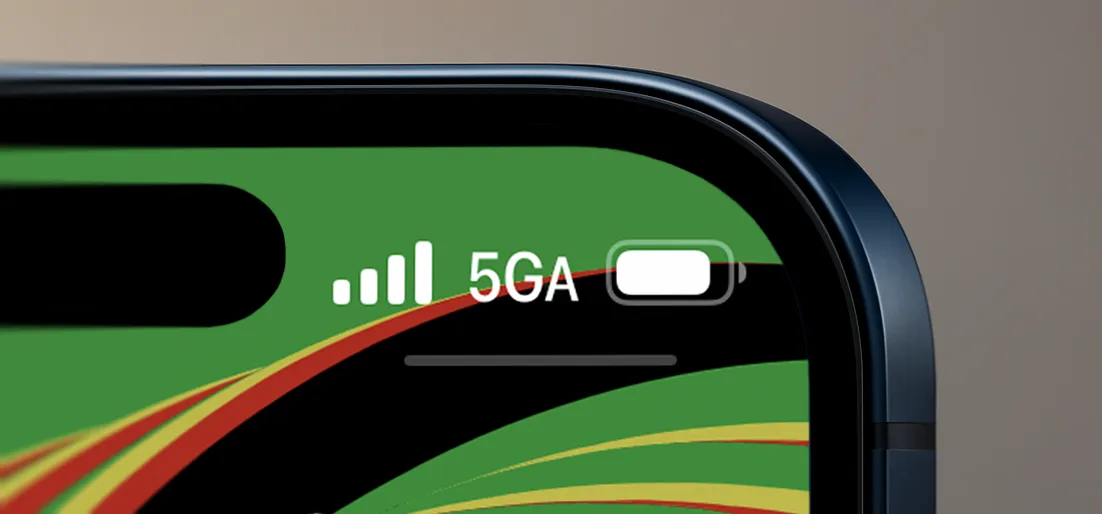Apple's iOS 18.5's code has introduced a new localization string that suggests the company is preparing support for "5G Advanced," the next evolution of cellular technology.
Specifically, the code includes a new "status.network.5ga" = "5G Advanced" string, which could point to upcoming system-level support for showing a 5G Advanced label in the iPhone status bar or settings.
Joining that string are ones for 5G, 5G+, 5G Evolution (E), 5G Ultra Capacity (UC), 5G Ultra Wideband (UW), LTE, 4G, 3G, Edge (E), and GPRS (G), all supported on iPhone already with their own status bar icons. It hints that Apple is preparing to support 5G Advanced (5G-A) cellular technology based on 3GPP Release 18 standards in a future software or hardware update.
What is 5G Advanced?
5G Advanced (3GPP Release 18), often described as 5.5G, introduces smarter and more adaptable network capabilities. With support for features like AI-based network optimization, ultra-low latency, and improved location accuracy, it enhances everything from real-time video to autonomous systems and augmented reality experiences. Key enablers of 5G Advanced include standalone 5G (SA) networks — which operate independently of older 4G infrastructure — and advanced carrier aggregation, which combines multiple bands of spectrum for faster speeds and greater capacity.
T-Mobile began its initial rollout of 5G Advanced in early 2025 on a limited basis and calls it the foundation of 6G; the company announced on April 24 that its T-Mobile 5G Advanced network is now available nationwide.
The iPhone 16 and modem mystery
While rumors suggested the iPhone 16 Pro and Pro Max would feature the powerful Snapdragon X75 modem — Qualcomm's first modem explicitly designed for 5G Advanced — teardowns and insider confirmations have shown otherwise. All iPhone 16 models, including the base, Plus, Pro, and Pro Max, use the Snapdragon X71M modem, not the X75.
The Snapdragon X71M is an evolutionary step up from the X70 used in the iPhone 15 series. However, Qualcomm has not officially published any technical documentation on the X71M, unlike its newer X72 and X75. The X72, for example, is explicitly described as "5G Advanced-ready" and capable of being upgraded via software to support Release 17 and 18 features. With no similar public claims for the X71M, uncertainty remains about whether it's fully capable of supporting 5G Advanced or just partially ready.
Without public confirmation from Qualcomm or Apple, it's unclear whether the X71M supports the full set of 5G Advanced features required to display the label. The consensus online is that 5G Advanced on the iPhone 16 series is not supported.
What about the iPhone 16e?
The iPhone 16e, Apple's more affordable model, introduces the in-house C1 modem, which does not support mmWave 5G and reportedly focuses on power efficiency. It appears unlikely that the C1 modem can handle 5G Advanced features, especially the high-bandwidth, low-latency demands central to Release 18.
Speed benchmarks and misattributed hype
Initial speed tests show the iPhone 16 Pro achieving 20%–26% faster download speeds than the iPhone 15 Pro on major US networks. Early coverage mistakenly attributed this performance leap to the X75 modem. While the X71 is clearly improved over the X70, these gains likely result from optimized carrier aggregation and better integration rather than a generational leap in modem design.
Carrier readiness for 5G Advanced
T-Mobile is the most aggressive US carrier pushing 5G Advanced features, which initially aimed for deployment by the end of 2024. Its standalone 5G infrastructure and spectrum assets make T-Mobile the ideal early partner for such a rollout. The company had been cautiously rolling out 5G Advanced but finally pushed it out nationwide starting on April 24. AT&T and Verizon trail in full standalone 5G support.
Who will actually see '5G Advanced' on iPhone?
The presence of the 5G Advanced status label in iOS 18.5 strongly indicates that Apple is preparing for devices to connect to Release 18 networks. However, support for displaying "5G Advanced" may be limited to future hardware — and the feature may not go live until a later iOS 18.x update or even iOS 19.
The iPhone 16e with the C1 modem almost certainly lacks compatibility.
The Snapdragon X71M in the iPhone 16 lineup is still a gray area. However, word of mouth online is that it does not support 5G-A. Without Qualcomm explicitly stating it's 5G Advanced ready (like they do for X72 and X75), it's likely Apple will not enable the label for these models.
The upcoming iPhone 17 series may be the first to fully embrace 5G Advanced, either with a newer Qualcomm modem or an upgraded in-house solution.
Until more information is released by Apple or Qualcomm, 5G Advanced on current iPhones remains a possibility — but not a guarantee. We've reached out to Apple multiple times for details about its plans for 5G Advanced support but haven't heard back yet.
Don't Miss: What's New in iOS 18.5? Small but Smart iPhone Upgrades
Cover photo and screenshots by Gadget Hacks.

























Comments
Be the first, drop a comment!